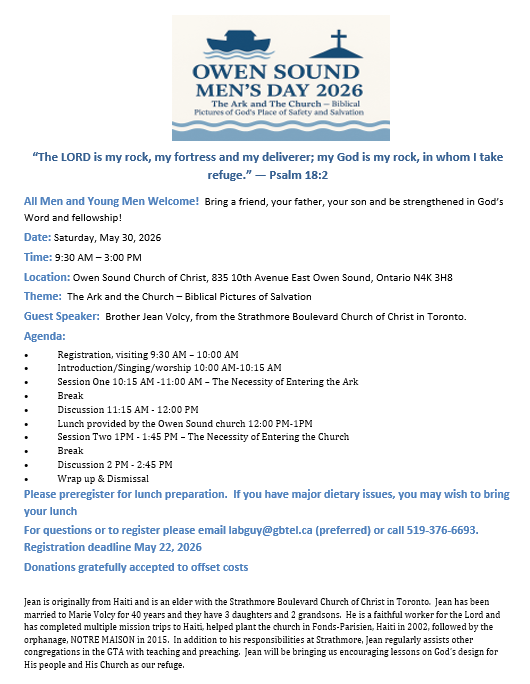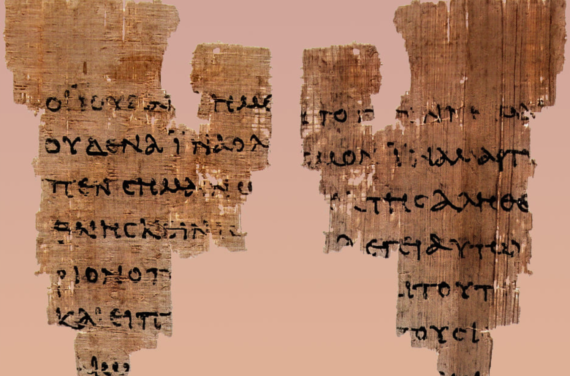In John chapter 6, Jesus makes a solemn declaration about himself. He said: I Am The Bread of life. What an amazing and encouraging statement! But how well did his listeners understand him? And were they prepared to respond in faith? Let’s follow John’s detailed account of what took place.
22 The next day [after Jesus had walked on the lake on the way to Capernaum (verses 16-21)] the crowd that had stayed on the opposite shore of the lake realized that only one boat had been there, and that Jesus had not entered it with his disciples, but that they had gone away alone. The people were looking for Jesus. When some boats from Tiberias came back and the crowd realized that neither Jesus nor his disciples were there, they got into the boats and went to Capernaum in search of Jesus.
Why were these people so determined to find Jesus? Jesus knew why, no matter what it was that they said. They were excited to find Jesus on the other side of the lake, but knowing their motives
Jesus said to them “Very truly I tell you, you are looking for me, not because you saw the signs I performed but because you ate the loaves and had your fill. 27 Do not work for food that spoils, but for food that endures to eternal life, which the Son of Man will give you. For on him God the Father has placed his seal of approval.” (John 6:26-27).







They were more concerned about their stomachs then their spiritual well-being. So it was that when Jesus started calling on them to believe in him as the one sent by God (v.28), that they admitted what they were really after. 30So they asked him, “What sign then will you give that we may see it and believe you?What will you do? 31Our ancestors ate the manna in the wilderness; as it is written: ‘He gave them bread from heaven to eat.’”
Unbelievable! Just the day before, Jesus performed the miracle of feeding 5000 men with just a small lunch (verses 1-15). And now they were back demanding another miracle so that they may believe in him. And they had something very specific in mind; the said “Our ancestors ate the manna in the wilderness; as it is written: ‘He gave them bread from heaven to eat.” John 6:31
As Adam Clarke put it: “Their argument seems to run thus: Thou hast, we grant, fed five thousand men with five loaves and two small fishes; but what is this in comparison of what Moses did in the desert, who for forty years fed more than a million of persons with bread from heaven: do something like this, and then we will believe in thee, as we have believed in Moses.” In other words, Yes, you fed 5,000 men with five loaves and two small fishes. So, what? Didn’t Moses do greater things than that? Do something like that then maybe we will believe.
Jesus promised them something greater than manna because he was greater than Moses. God had multiplied food in order to produce faith in his Son. And for those perceptive enough, this kind of food was food for thought…leading to faith in the one who offered them eternal life. But they were stuck on food and thought that manna was the answer.
They were so focused on physical needs that they failed to grasp what Jesus was saying. What the apostle Paul said was true. “The natural person does not accept the things of the Spirit of God, for they are folly to him, and he is not able to understand them because they are spiritually discerned. (1 Cor. 2:14, ESV)
When Jesus announced that He was the bread of life, they really did not get it. They began to grumble and to think of all of the reasons why Jesus was no one special. They said, “Is this not Jesus, the son of Joseph, whose father and mother we know? How can he now say, ‘I came down from heaven’?” (John 6:41-42).
Wanting to help them, Jesus told them to stop grumbling (v.43), and he continued trying to explain the good news to them (John 6:47ff): He said: “47Very truly I tell you, the one who believes has eternal life. I am the bread of life. Your ancestors ate the manna in the wilderness, yet they died. But here is the bread that comes down from heaven, which anyone may eat and not die. I am the living bread that came down from heaven. Whoevereats this bread will live forever. This bread is my flesh, which I will give for the life of the world.”
It should have been obvious that Jesus was speaking figuratively. And it is still so easy to deliberately miss what the scriptures are saying when we do not want to accept the message. Those who misunderstood and many who were offended turned away. It was a ‘hard teaching’. But it was only so for those who did not wait for further explanation. They made up their minds to hear no more and turned their backs on Jesus.
But, not everyone left. Thank God that the 12 did not rush to judgment. Turning to them, Jesus asked “You do not want to leave too, do you?” Speaking for the group Peter said: “Lord, to whom shall we go? You have the words of eternal life. We have come to believe and to know that you are the Holy One of God. (John 6:67-69)
Peter was right. There was no one else from whom eternal life could be had, nor is there now.
At the end of those 40 years, the one who gave them manna explained that: “…man shall not live on bread alone, but man shall live on everything that comes out of the mouth of the Lord”. (Deut 8:3b). Jesus updated that when he said: “The Spirit gives life; the flesh counts for nothing. The words I have spoken to you—they are full of the Spirit and life.” John 6:63, NIV

